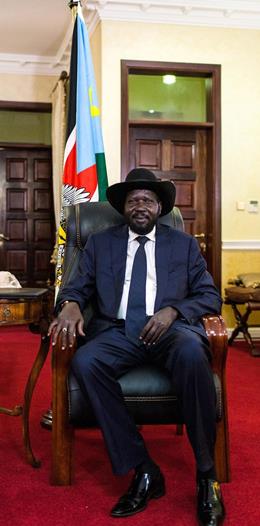Kiir to appoint ex-rebels into government positions
November 7, 2013 (JUBA) – South Sudanese president Salva Kiir is expected to appoint to ministerial and advisory positions former rebels who heeded to amnesty calls to abandon rebellion against his government, a highly-placed government official told Sudan Tribune on Thursday.

The politicians to be appointed to ministerial and advisory positions will be from Western and Northern Upper Nile states where the rebels were active.
“They will have one advisor at the central government. This has already been agreed and details about who would be appointed at the state level is being worked out,’’ the government official said.
The official said Gordon Buay, a spokesperson of the former rebel groups, will be appointed an advisor on youth in the central government.
“So far, Gordon Buay has been nominated to fill the post of advisor on youth empowerment,” the source who is informed about the behind- the- scene ongoing negotiations, said.
Additionally, the deal will also see the government integrating into the Sudan People’s Liberation Army (SPLA) five Major Generals, six Brigadier Generals and 15 Colonels.
Fighters previously belonging to the former rebel groups, according to the official, will be screened and those found to be physically fit will be integrated into the army while others will be sent to the national police, wildlife and the fire brigade.
All this will reportedly be done before the end of this year.
The official source did not specify which groups would be integrated, although some military sources said the process targets “all the armed groups” that responded to the presidential amnesty extended by Kiir.
President Kiir gave an amnesty to all rebel groups fighting his administration. In April 2013, the president issued another general amnesty.
Among those who responded to the amnesty were Bapiny Monytuil and Johnson Uliny of the South Sudan Democratic Movement (SSDM), an armed group which was launched by George Athor Deng in 2010 after the Sudan People’s Liberation Movement (SPLM) declined to support his candidature in Jonglie State.
Deng was one of the more than 300 senior officials the SPLM disowned before elections after failing to concede in favour of the official nominees.
He was later killed in December 2011 under unclear circumstances at South Sudan border Town of Morobo County in central Equatoria. His fighters who were under the command of Peter Kuol Col were later integrated into the SPLA.
Independent analysts say the deal between the government and the former rebels has left out some groups, which abandoned rebellion after the presidential amnesty.
(ST)
